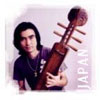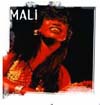


|
|||||||
|
|||||||

|
|||||||

|
|||||||

|
|||||||
|
|||||||

|
|||||||
|
|||||||

|
|||||||
|
|||||||

|
|||||||
|
|||||||

|
As ever, the weekend features a program of fantastic FREE on-site workshops hosted by WOMADelaide's visiting artists. The workshops are an exciting combination of explanation, demonstration, performance and interaction and are open to everyone. In 2004 the diverse topics covered include African Drumming, Macedonian Gypsy Brass, Vocal Traditions, Junk Funk and more.

AFRICAN DRUMMING
A passion for percussion ... this workshop will bring together a mix of artists from Africa to share their cultures, sounds, styles and inspirations. Don’t miss this frenzy of rhythm!
Saturday, 2000–2100, The Dell (6)

CONTEMPORARY FOLK
Eliza has not so much lived in the shadow of her famous folk icon parents, Martin Carthy and Norma Waterson, as bathed in the warmth and inspiration of their music. She has emerged as a truly individual performer in her own right, a fantastic fiddle player with a voice which ranges from tender and sexy to powerful and edgy, establishing herself as one of the most important young British musicians around today. This session will give audiences a chance to hear how Eliza has developed her material over recent years and to share some of her songs and stories.
Saturday, 1400–1500, Zoo Stage (4)
Playing into our Hands
Hamid Baroudi has always had an insatiable curiosity and hunger for new musical experiences. He has come a long way from his roots in Algerian rai, travelling the sounds of the world from Moroccan ‘gnaoua’, Brazilian Afro-bloc samba and West African ‘makossa’ rhythms to hip-hop and electronic dance beats. Take his eclectic approach and go with the flow of his anarchic musical direction, where you will become the instruments creating a new music which will inspire and delight.
Sunday, 1355–1450, The Dell (6)
THE INSTRUMENTAL WORLD OF INTI-ILLIMANI
In this workshop the band will talk about the huge variety of instruments they use and how they combine them to create the ‘Inti-Illimani style’, which takes its influence from the different traditions and regions of Latin America and Europe. Find out more about the instruments, the regions they are from and hear excerpts from different melodies. Prepare to be amazed at the extraordinary range of wind instruments from the Andean regions (the sicu and rondador pan pipes, quena, clarinet and flute), the strings (charango, cutro, tiple, dulcimer and guitar) and the percussion (bombo, leguero, cajon, tumbas and maraca). Inti-Illimani welcomes questions from the audience and encourages everyone to take part - this workshop isn’t just for musicians! The session will draw to a close with Inti-Illimani playing a few of their favorite tunes.
Saturday, 1400-1500, The Dell (6)

VOCAL TRADITIONS
[VOICE WORKSHOP]
Jon is well known as an interpreter of English traditional song. His background is in teaching and musical direction for the theatre. This session will focus on singing as a social activity - as ordinary as talking or laughter as a means of group communication. The workshop will also examine the way in which traditional music evolves within a social environment and whether 'old songs', can have a place within a modern lifestyle. Along the way he will try out some simple tricks for enhancing the natural singing voice, both through general techniques and by looking at some of the common, stylistic approaches to traditional song.
Friday 1840–1930, Zoo Stage (4)

EXPLORING KILA’S IRELAND
Kíla will perform a mix of instrumentals and songs, showcasing the different instruments and styles of music they play. This intimate performance using Uilleann pipes, flutes, fiddles and bodhran, will offer the audience an opportunity to ask questions about the instruments and the specific character of the music. Kila will explain the cultural development and history of their music and their instruments, as well as expanding on anything that seems intriguing or just plain baffling!
Saturday, 2000-2100, Zoo Stage (4)

MACEDONIAN GYPSY BRASS
While this workshop is primarily for experienced brass players (saxophone, clarinet, tuba, euphonium, tenor horns, trombones) and percussionists, it will be a fascinating process for the audience to observe. The Rom people (Gypsies) living in Macedonia are famous for their fine musicianship and among the styles of music they play, is a type of brass band music, particularly used for weddings, christenings, street celebrations and parties. While studying Macedonian bagpipes in Macedonia over 20 years ago, Linsey fell in love with their wild and exciting music and will be teaching the melodies and style of playing, using notated music and improvisation. He will be joined by Jess Ainsworth, a fellow musician familiar with Eastern European rhythms and Graeme Leek, plus members of Adelaide’s brass and percussion communities. Everyone involved will take part in WOMADelaide’s first-ever procession through Botanic Park on Sunday evening at 6.30pm. MUSICIANS – BRING YOUR BRASS INSTRUMENTS and Drum!
www.performinglines.org.au
Sunday, 1545-1645, Zoo Stage (4)

HUMARIMBA WORKSHOPS
In these sessions, Linsey will be working with the ‘humarimba’, a marimba played by three people at a time which is hooked onto the belts of two of the three players. The workshops are for a maximum of 24 participants and will be ‘hands on’ and by the end of the session, all participants will be playing a couple of pieces. (For the rest of the weekend, during daylight hours, the audience can simply turn up and have a go at playing Linsey’s 16 hand made marimbas...)
Friday 1830-1930
Saturday 1500-1600 and 1800-1900
Sunday 1330-1430
Marimbas Installation (near KidZone)

BLOWING UP A STORM
Mark is regarded as one of Australia's finest didgeridoo players, having collaborated with composer Philip Glass and played with rock legends like Led Zeppelin's Jimmy Page and Robert Plant as well as Aussie icons James Morrison and John Williamson. His tenacity and enthusiasm for his craft has ensured that the didgeridoo is well respected in diverse music genres, from classical to contemporary. His workshops encourage both professional and novice players to take part in a rewarding exchange, during which he presents the history of the instrument, how it's made, how to find one and how it's played. Mark will demonstrate his unique style of playing and use of breath, providing participants with an opportunity to try his techniques and practice methods. He will also offer insight into how he has used ancient breathing methods in his work with other musicians from around the world. Mark’s approach to this traditional instrument has made him a leader in the field and he will perform a few short pieces to illustrate his skills.
BRING YOUR DIDGERIDOO!
Sunday, 1355-1450, Zoo Stage (4)

AINU MUSIC
Oki will perform with his Tonkori, the traditional stringed instrument of Sakhalin Ainu (the indigenous Ainu people of Japan), giving a brief demonstration of its traditional rhythms and explaining its history and the particular features of Ainu music. Oki’s female vocal group, Marewrew, will demonstrate Upopo (song), Ukouk (a round), Mukkuri (bamboo mouth harp) and Rimse (dance). The repeat of a single phrase, which is the most characteristic element of Ainu music, will encourge the audience to experience a natural trance-like feeling. Oki will also discuss how the Tonkori changed him - a keen reggae and rock lover - and what his aims are in combining Ainu traditions and contemporary music.
Saturday 2200-2250, Zoo Stage (4)

WASSOULOU ROOTS
Oumou is a singer-songwriter, social commentator and champion of women’s rights as well as a star performer. Come and share the traditional music (‘Wassoulou’) of her homeland, and discover how she has revolutionised the sounds to bring them to an international platform. Wassoulou singers sing their everyday concerns; these are very different from the well-known jalis, or praise singers, who sing to the glory of their ancestors. Find out how Oumou’s growing political awareness has influenced her music and her life. This will be an exhilarating session with one of the most potent and passionate voices to come out of Africa today.
Friday 1930–2020,
Moreton Bay Stage (5)

Navajo/Ute Culture
Triple Grammy nominee R Carlos Nakai was born in Arizona of Navajo and Ute parentage. He has not only introduced and popularised the ancient flute traditions of his people, but has fused various forms of music with his own and has more than 30 albums to his credit (including the first by a Native American to sell more than 500,000 copies). At this workshop he will demonstrate and discuss his use of the traditional cedar flute of his culture, which builds on the tradition of his culture and uses the experiences that surround him to revitalise the ancient stories.
1745-1845 Sunday, Zoo Stage (4)

MUSICAL MOVES
Risenga Makondo (of Sotho Sounds) is a remarkable musician in his own right, rooted in his Venda traditions but versed in an extraordinary range of music, tracing the diaspora from Africa to South America and digging for the roots of jazz. Risenga was a founder member of Amompondo, played for Nelson Mandela’s 80th birthday concert and has worked as a music therapist, teacher and choreographer. His workshops confront, contradict and catapult you into a wealth of rhythms ...dance, drum and delight in his energy, charisma and versatility.
Saturday, 1800–1900, Zoo Stage (4)

MAKING INSTRUMENTS FROM JUNK
What happens when you have no instruments or music teachers or access to live music ... the answer is Sotho Sounds! For inventiveness, musicality and sheer determination, they win hands down. This exuberant group of young musicians, from the landlocked Kingdom of Lesotho in Southern Africa, will tell you about their experiences of shepherding and music making and life after leaving their village for the first time in 2003 to perform at WOMAD in the UK. Their joyful approach and insistent rhythms are irresistible!
Sunday, 1745–1845, The Dell (6)

ROOTS ROCK REBELS FOR REAL
Tinariwen are one of the most radical, revolutionary and renowned groups to have come out of the southern Sahara Desert. They have created a new and contemporary style of Touareg music, called ‘Tishoumaren’, which is a kind of desert blues combined with the traditional forms of guitars, tehardant, n’goni and vocals and distinctive handclaps. Discover more about their instruments and their music through their story of exile and resistance and the emergence of this wonderful and extraordinary music.
Friday 2020–2120, Zoo Stage (4)

TRANSITIONS AND TRADITIONS
Savina and the ensemble Primavera en Salonico have, over recent years, developed an extraordinary repertoire of music from Sephardic folk songs, traditional material from the Mediterranean, songs from Cyprus, Sardinia, Turkey and Greece including medieval, renaissance and baroque music from Europe. This workshop will give you an insight into how the music has developed, the fascinating combination of instruments and techniques, semblance and difference and, above all, Savina’s unique interpretation. Stand by for some startling examples of improvisation and an opportunity for questions and discussion.
Sunday, 1945–2045, Zoo Stage (4)

CROW FIRE MUSIC
Meet the north-east Arnhemland Aboriginal artists from Ramingining who front the music of Waak Waak Jungi and participate in traditional Aboriginal dances. Bobby Bunnungurr is an acclaimed traditional painter, songman and dancer of the Malibirr tribe. His language is Gandalbingu and his dreamings are magpie goose, crocodile, waterlillies and turtles. Jimmy Djamunba is a highly respected songman and ceremonial leader of the Marangu tribe. His language is Dijnang and his dreamings are blackcrow, stringbark, honeybee, breamfish and palm tree. Derived from their two traditional languages the name Waak Waak (from Jimmy’s Djinang) and Jungi (from Bobby’s Gandalbingu) their name means Crow Fire. It represents the meeting of the two moieties Dhuwa (Jimmy) and Yirritja (Bobby) by which, in the indigenous beliefs of Arnhemland culture, all people and things are at once separated, united and in balance. In a casual and relaxed atmosphere, Bobby and Jimmy will demonstrate the dances associated with Waak Waak Jungi songs such as Black Crow and White Cockatoo and give you an opportunity to share in their unique culture.
Saturday 1600-1700, Zoo Stage (4)

DANCING THE RED FLAG
Yilila will begin their dance workshop with a powerful and colorful display of traditional dance from Numbulwar (South East Arnhem Land, NT). Red Flag dancing and music has developed over hundreds of years of trade and contact with the Maccassan ships from Indonesia. The dancing mixes traditional Aboriginal ceremony style dance with the ‘actions’ from the Maccassan ships - there are actions for raising sails, anchors and flags and for looking through telescopes and over the horizon. Each generation of dancers from Numbulwar brings a new style of Red Flag dancing but it’s still considered most unusual to see Aboriginal people dancing with flags and performing the ‘ship board movement’. Yilila usually teach their dancing to children only, around the Top End of the Northern Territory, but at WOMADelaide they will teach adults and children the history, the different styles and how to dance the Red Flag, accompanied by singing, clapsticks and didgeridoo.
Sunday, 1545-1645, The Dell (6)

THE RHYTHM EXPERIENCE
Don’t miss this session with a remarkable musical maestro; a classical tabla virtuoso of the highest order. Zakir Hussain is a favourite accompanist to India’s foremost classical musicians and dancers. He will be presenting the tabla in its use as a dance accompaniment – Zakir is widely known as India’s premier accompanist for Kathak, the North Indian classical dance style - and will be joined by Antonia Minnecola for this section of the workshop. He has been touring since the age of 12 and is a percussion phenomenon. Share his fascinating musical journey, experiences and collaborations and ask all those questions you’ve always wanted to ask about Indian music.
Saturday, 1800–1900, The Dell (6)
|
|
|






























